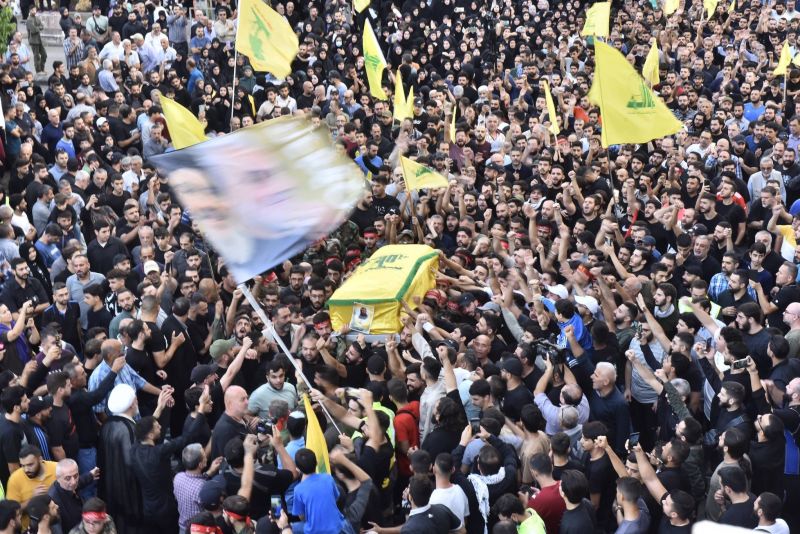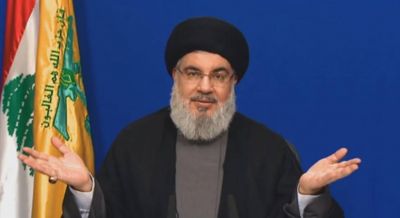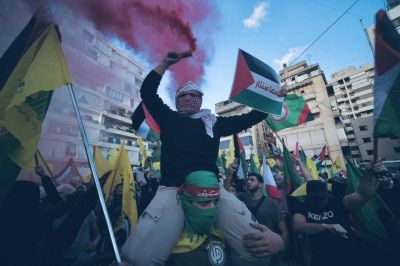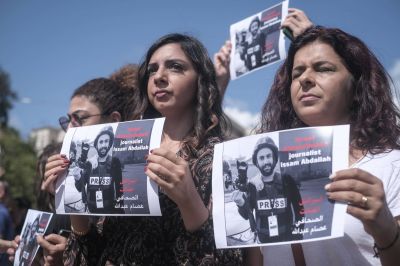
Members of Hezbollah during the funeral of a party member killed following Israeli bombings in South Lebanon, Oct. 21, 2023, in Beirut's southern suburbs. (Credit: Mohammad Yassin/L'Orient-Le Jour)
The moment when the father of Mohammed Hassan Mansour, a Hezbollah fighter, learned of his son’s death in an Israeli strike on Oct. 22, was widely circulated online.
In the video, the father is seen smiling. He hugs his other son and tells him, “It will be your turn soon.”
Since Hamas’ surprise attack on Israel Oct. 7, Hezbollah has lost at least 36 operatives in Israeli raids in southern Lebanon. The Israeli strikes came in response to the party firing rockets toward Israel.
Hezbollah is keen on “celebrating and glorifying” its dead in a press release dedicated to each one of the “martyrs” who have recently been killed. The photos of young and smiling fighters are everywhere to be seen on the party’s social media.
Hezbollah appears to be responding to those who accused it of “not doing enough” in the ongoing conflict, notably on the part of Khaled Mechaal, leader of Hamas’s political wing abroad.
During the funeral of a Hezbollah fighter in southern Lebanon on Friday, the head of the Hezbollah parliamentary bloc, Mohammad Raad, seemed to be conveying a message in response to the accusations.
“We are not merely observers, and we do what we have to do, according to our vision that supports our central cause and protects our people,” Raad said in a statement, arguing that the party has no use for “talkers.”
“What we do, we do for God,” he said.
A product of Iran’s 1979 Islamic revolution, Hezbollah’s ideology is intrinsically associated with Shiite political Islam, the “velayat e-faqih” [or clerical rule] of Iran’s supreme leader.
Martyrdom and “Islamic resistance” became the party’s cornerstone.
In Shiism, like in many other religions, dying in defense of one’s homeland or religion is seen as a great honor, with paradise promised to “martyrs” — a notion highlighted in the Quran’s Surat al-Tawbah (“repentance”).
“Allah has indeed purchased from the believers their lives and wealth in exchange for Paradise,” reads verse 111 of the Sura.
“Martyrdom is said to be the trade of intelligent men,” Shiite Sheikh Sadek Nabulsi, close to Hezbollah, told L’Orient-Le Jour. “Life and all material goods are worth nothing compared to the promise of eternal rest in Paradise.”
“And nothing is more noble than dying in the name of God and protecting all members of our society, whatever their religion,” Nabulsi said.
This notion, however, has unsurprisingly been exploited for political purposes, as the “path of Allah” remains vague enough to accommodate various causes.
In the 1980s, during the peak of the conflict between Iraq and Iran, Western media outlets reported that Iran had deployed thousands of children as suicide operatives, who were promised passage into Paradise after attacking Iraqi positions.
“Iranian Shiism has completely changed the notion of martyrdom,” said Shiite intellectual and essayist Mona Fayad, a vocal detractor of Hezbollah. “From now on, it’s no longer a question of dying to defend one’s homeland and religion; it’s about attacking others.”
“Children are particularly targeted by a real publicity campaign for martyrdom, especially in Shiite schools,” Fayad said. “Opposing it is a risky game, as you run the risk of marginalization or worse.”
Hezbollah’s ideological machine is keen on “convincing” young people to die for the “resistance” against Israel, the United States and all “enemies of Islam.”
The cult of martyrdom is used to recruit young people, as it is by secular nationalist movements in the Western world.
The Syrian ‘awakening’
In recent years, however, the martyrdom glory faded away.
“After the liberation of the South in 2000, and then the July 2006 war, [Hezbollah leader] Hassan Nasrallah and his group were placed on an almost divine pedestal,” said Ali Amin, editor-in-chief of the Janoubia website and a critical expert on Hezbollah.
“For many, Hezbollah dealt a heavy blow to Israel.”
“From then on, the parents and relatives of a slain fighter found comfort in the idea that he had died for a good cause,” Amin added.
But from 2011, when Hezbollah youth were sent to die in Syria to protect Bashar al-Assad’s regime, criticism of the party became more pronounced even within Shiite families. Even though the emergence of the Islamic State allowed Nasrallah to justify the party’s involvement in the Syrian conflict as necessary for protecting minorities, both Shiite and Christian, concerns within the Shiite community grew.
According to some estimates, more than 1,500 Hezbollah fighters died in the Syrian war. The party, however, had kept a low profile and made no media announcement on the exact number of its casualties.
Criticism of the party persisted. “In 2012, a delegation of Hezbollah members visited a village in southern Lebanon to tell a relative, who didn’t even know his son was in Syria, that his son had died fighting against the [Syrian] opposition,” said a Shiite opponent of the party who requested anonymity.
“The relative [of the deceased Hezbollah fighter] was so angry that he threw stones at them,” he said.
“To alleviate tension, Hezbollah opted for a different approach, assigning senior party officials to make the announcements in order to intimidate the families of slain fighters,” the opponent added. “The party even took charge of the funerals and never left the relatives alone, so as to be able to control their statements to the press and visitors.”
Today, the party appears to adopt a more assertive communication approach in the context of the current conflict with Israel. This shift is influenced by the fact that a majority of the Shiite community sympathizes with the Palestinians in the Gaza Strip, which has faced relentless shelling since Oct. 7.
“Despite pro-Palestinian sentiment, most people in the south are silently opposed to the idea of a major war and fear for their lives and work,” said Amin.
Financial stability
In Amin’s opinion, the video of Mansour’s father is part of the process. “It was probably orchestrated and controlled by Hezbollah,” he speculated. Any more spontaneous or critical reaction would have been deemed unacceptable and would have exposed him to heavy consequences.”
Not only does the father run the risk of reprisals from Hezbollah, which does not tolerate dissent within the community, but he could also lose the generous subsidies paid to the families of the “martyrs.”
“There are institutions within Hezbollah that take care of the families of these killed members, taking into account factors such as the rank of each fighter,” said Joseph Daher, author of the 2016 book Hezbollah: The Political Economy of Lebanon's Party of God.
With social security coverage, a monthly allowance and prestigious status within the community, being part of a “martyr’s” family becomes a valuable opportunity for financial stability at a time when the country has been sinking into an unprecedented economic crisis, and the state provides very few social benefits.
This promise of financial stability complements the ideological component in the pro-Iranian party’s propaganda. The “Martyrs Social Charitable Foundation” is part of this armada. According to the commercial register, it owns an investment company (Atlas Holding), which in turn owns pharmaceutical companies and petrol stations. According to the Israeli research center Meir Amit, by 2019 the foundation was disbursing some $12,000 a year to each child of a slain fighter. This strategy has enabled the Shiite party’s membership to explode in recent years.
“The party recruits from peripheral and marginalized Shiite regions, especially as young people of this faith have fewer opportunities abroad, particularly in the Gulf countries, where they are often turned away,” said Daher. “Joining the ranks of the pro-Iranian party therefore becomes a rare opportunity to earn a sufficient income.”
Daher added that recently recruited Hezbollah fighters display less ideological and religious rigor than their older comrades. This is one of the reasons why most of the “martyrs” of the “Al-Aqsa Flood” campaign this October are young, marginalized men in their 20s.
Indeed, in the early months of Lebanon’s 2019 financial crisis, as the Lebanese pound began its plunge into the abyss, Hezbollah — which benefits from Iranian funding and is accused of profiting from the trafficking of Captagon between Lebanon and Syria — was one of the few parties to pay salaries to its members in dollars. These are salaries that will still be paid even if one of them is elevated to the title of “martyr.”
This article was originally published in French in L'Orient-Le Jour. Translation by Sahar Ghoussoub.


